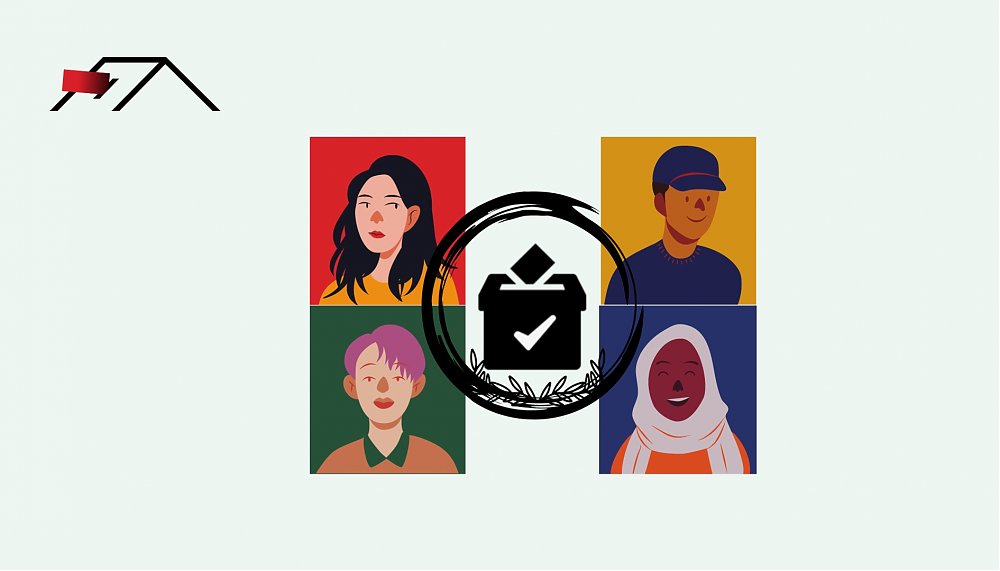Think Policy, through Bijak Memilih, collaborates with Indonesia Corruption Watch (ICW) and karetjejak.net in voter education. These two platforms contain various information, such as a history of corruption, which is important for voters to consider in the 2024 elections.
Bijak Memilih those who provide political education in light language. Bijak Memilih is an independent, digital-based movement that provides alternative, quality political information spaces so that young voters can make their choices wisely. The features that have been released on the platform contain various important information that is basic, but not many young voters know about it. Such as the intricacies of strategic issues related to policy. At least, the Bijak Memilih platform can help young voters think long before making a choice and prevent them from making wrong decisions.
Rekamjejak.net ICW can be a credible and accountable reference database amidst the flood of information that is about to sweep away young voters. Politicians include their political party background; we can see their track record regarding legal cases and their assets.
Referring to data from the General Election Commission, 56%, or 113,622,550, of the total voters are young voters from Generation Z and the Millennial Generation in the age range of 17–40 years. Interestingly, half of the category of young voters are beginner voters or first-time voters aged between 17 and 21 years, namely those who have met the requirements to exercise their right to vote for the first time in the upcoming 2024 elections.
One of the reasons Think Policy created Bijakmeoleh.id was because young voters did not have sufficient knowledge and experience to face the political year. When they have to make political choices, they tend to be indecisive, easily swayed and overwhelmed because they are influenced by the various information they receive in the dynamics of everyday life. Especially the influence of family, peer relationships, educational environment, workplace, community, and various other echo chambers.
This scope has a big influence in determining the political decisions that someone will make and has the potential to lead to the flow of political preferences among young voters, which in turn will lead to a decline in democracy. One indicator is the shrinking of civil freedoms of opinion and expression.
Social bias
According to psychological studies, what is emphasized by Think Policy is known as groupthink. This phenomenon of social bias occurs in decision-making, where an individual is trapped by the demand to produce unanimity in the group. Self-adjustment, or false consensus, is forced. This is usually driven by feelings of discomfort, which are often done in the name of maintaining unity and avoiding conflict.
This self-adjustment often hijacks the critical thinking and reflection process, which should take priority before making a decision. A strong attachment to being part of a group often blinds a person from making the right decision. This condition is also influenced by unequal power relations, which are vulnerable to being carried away by the majority vote.
Usually, someone who differs from the majority will be "rejected" by the group. In other words, in order to gain acceptance, a person must be willing to have an equal voice in the group. In certain situations, the phenomenon of social bias can also affect someone who does not have a firm voice on something, so this person has a tendency to adopt what other people choose.
An example of the influence of social bias operating within a group can be seen in Slank's actions in the 2014 elections. Slank is a senior band entity that has been active in the music industry for almost 40 years. They officially stated that they support the presidential candidate and vice presidential candidate, Jokowi-JK; they even intensively campaigned for Slankers to vote for Jokowi-JK and predicted that the Slankers, who were known to be loyal, would certainly follow the choice of the Slank Band personnel. Not long ago, 133 Slankers branches throughout Indonesia declared their political choice for the Jokowi-JK pair. In this context, the social bias syndrome can be said to have been successfully played out.
Looking at the current context, young voters tend to still be confused in making their political choices ahead of the 2024 elections, so they are vulnerable to being entangled in social bias. This is suspected to be due to the difficulty of finding sources of information that are systematic, easy to understand, and reliable for young voters. It needs to be acknowledged that the government does not appear to be able to provide an integrated and friendly political information center for young voters. So, young voters need to equip themselves with survival kits that can save them from being hit by the storm of social bias.
What are some tips for dealing with social bias syndrome ahead of the 2024 election? Empathy is the main keyword. In order to build a healthy democratic climate, young voters need to be empathetic to the choices of other people in their group, without the need to intend to change their own or other people's preferences. In order to make personal decisions with full awareness regarding who we will vote for in the 2024 election agenda, we need to buy time while focusing on looking for various information. []
BRIGITTA NOVIA LUMAKSO











